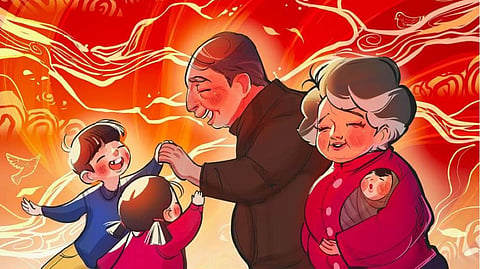How Can Seattle's CID Keep Elders Safe? New Bilingual Pamphlet Offers Tips
Close to 100 people gathered on Nov. 15 at the Chinatown-International District Community Center for a celebratory launch of a project more than a year in the making. Hosted by OCA Greater Seattle, the event marked the launch of a public safety pamphlet called "With Love for Our Grandparents & Seniors."
Both the launch event, the third annual "CID Cares: Care for Community, Care for Self," and the pamphlet were a multigenerational collaboration that included 12 organizations and groups, including University of Washington students, with support from Seattle Parks and Recreation and Historic South Downtown.
The comic book-style guide provides safety tips for seniors in both English and Cantonese, including education on common scams and support resources in the event of an emergency or attack. According to 2025 UW graduate and project volunteer Stella, the pamphlet is a labor of gratitude. "I'm here because [the pamphlet] is helping our community. They take care of us, and we want to take care of them," she said.
"With Love" is an aptly timed document and community undertaking, according to Connie So, program host and UW American Ethnic Studies professor. Beacon Hill saw a staggering number of home invasions targeting seniors in 2023, a pattern that traces back to 2016. Stop AAPI Hate cites that people of Chinese descent became the most frequently targeted group for hate crimes among Asian Americans during the height of COVID-19, followed by people of Korean and Vietnamese descent. So, a Hong Kong immigrant whose community members in Beacon Hill were impacted by the 2023 home invasions, told the audience: "[The AAPI community] asked the police to help us and were met with indifference, so we decided to do something ourselves."
Of the CID's 5,000 residents, about half are seniors, who are more susceptible to violence like physical attacks and targeted scams because attackers assume they have less awareness and more cash on hand. OCA organizer Amy Chen Lozano said, "The CID averages about one homicide a month. We know Seattle's white neighborhoods wouldn't stand for it, so why should we?"
The launch itself was an energetic affair. Along with the pamphlet, attendees received gift bags upon entry and enjoyed socializing with neighbors in languages including Chinese and Vietnamese. Tabling organizations included International Community Health Services and Choy Vong, a singer/songwriter and former Seattle Public Schools teacher, provided Cantonese translation services and, accompanied by student Dylan Hartono, performed a song about the meaning of home to open the program.
In a review of the pamphlet, So and Vong gauged the audience's lived experiences in a Q&A format, seeking feedback for questions like "What do you do if you notice someone is following you? What happens if you realize you've left your keys inside or gotten locked out?" They also discussed other common scenarios seniors may face when out and about or at home.
Volunteers, former students from a UW Asian American Studies class, kept the audience laughing with situational awareness skits. Speaking of the program-planning process, Chen Lozano said, "We wanted [the elders] to be entertained, in language. We hope they'll refer back to the pamphlet like a comic book."
The younger generation ultimately hopes to look after and support independence for the aging population of the CID, an area that, according to the pamphlet, has fallen victim to political neglect and outright indifference. Chen Lozano enlisted so-called "building bosses" who live in senior housing to spread the word about the pamphlet to people who weren't able to attend.
"[We want] to show our elders they're not forgotten," she explained. "The pamphlet offers general awareness for a variety of topics. If you're targeted, don't be ashamed. Seek help."
You can access and share a PDF of the public safety pamphlet online.
This article is published under a Seattle Human Services Department grant, “Resilience Amidst Hate,” in response to anti-Asian American, Native Hawaiian, and Pacific Islander violence.
Help keep BIPOC-led, community-powered journalism free — become a Rainmaker today.


